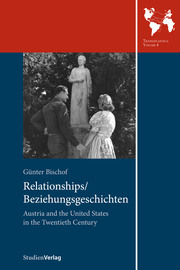Detailansicht
Relationships/Beziehungsgeschichten. Austria and the United States in the Twentieth Century
eBook - Transatlantica, Volume 4
ISBN/EAN: 9783706557276
Umbreit-Nr.: 6641869
Sprache:
Englisch
Umfang: 274 S., 1.54 MB
Format in cm:
Einband:
Keine Angabe
Erschienen am 28.04.2014
Auflage: 1/2014
E-Book
Format: EPUB
DRM: Digitales Wasserzeichen
- Zusatztext
- After the breakup of the Habsburg Monarchy, the Austrian-American relationship was characterized by a dwarf confronting a giant. America continued to be a heaven for a better life for many Austrian emigrants. For the growing American preponderant position in the world after World War I, the small Austrian Republic was insignificant. And yet there were times when Austria mattered geopolitically. During the post-World War II occupation of Austria, the U.S. helped reconstruct Austria economically and was the biggest champion of its independence. During the Cold War, the U.S. frequently used Austria as a mediator site of summit meetings. American mass production models, consumerism, and popular culture were adopted by Austrian youth. Americanization and American preponderance also produced anti-Americanism. With the end of the Cold War and Austria's accession to the European Union it once again lost significance for Washington's geopolitics.
- Kurztext
- After the breakup of the Habsburg Monarchy, the Austrian-American relationship was characterized by a dwarf confronting a giant. America continued to be a heaven for a better life for many Austrian emigrants. For the growing American preponderant position in the world after World War I, the small Austrian Republic was insignificant. And yet there were times when Austria mattered geopolitically. During the post-World War II occupation of Austria, the U.S. helped reconstruct Austria economically and was the biggest champion of its independence. During the Cold War, the U.S. frequently used Austria as a mediator site of summit meetings. American mass production models, consumerism, and popular culture were adopted by Austrian youth. Americanization and American preponderance also produced anti-Americanism. With the end of the Cold War and Austria's accession to the European Union it once again lost significance for Washington's geopolitics.
- Autorenportrait
- Günter Bischof is the Marshall Plan Professor of History and Director of CenterAustria at the University of New Orleans.
